

IDEAS Resources. Science Fair Project Ideas, Answers, & Tools. NGSS Hub.
Should I teach problem-, project-, or inquiry-based learning? SmartBlogs. Lately, there have been a bunch of buzzwords floating around the education world that all seem to mean the same thing.
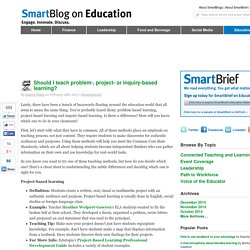
You’ve probably heard them: problem-based learning, project-based learning and inquiry-based learning. Is there a difference? How will you know which one to do in your classroom? First, let’s start with what they have in common. All of these methods place an emphasis on teaching process, not just content. How Are We Preparing Students to Be Tomorrow's Innovators? Follow the discussion on Empowering Education Leaders to Innovate on Wednesday Jan. 30 at 3pm PST.
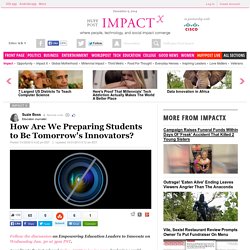
According to the just-released Gallup-HOPE index for 2012, developing a world-changing invention is an aspiration shared by 42 percent of youth in grades 5-12. That's good news. Students Tell All: What It’s Like to Be Trusted Partners in Learning. Science Leadership Academy students (Bailey Collins) Inquiry-based learning is not a new pedagogy, but it has come back into fashion in progressive education circles recently because of new emphasis on the power of students’ innate curiosity to drive learning.
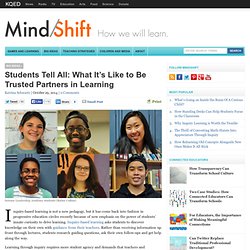
Inquiry-based learning asks students to discover knowledge on their own with guidance from their teachers. Rather than receiving information up front through lectures, students research guiding questions, ask their own follow-ups and get help along the way. Learning through inquiry requires more student agency and demands that teachers and administrators trust that students will ask when they need help. Abcdoes.typepad.com/files/lighting-the-fire-community-play-things.pdf. The Inquiry Page. Based on John Dewey's philosophy that education begins with the curiosity of the learner, we use a spiral path of inquiry: asking questions, investigating solutions, creating new knowledge as we gather information, discussing our discoveries and experiences, and reflecting on our new-found knowledge.
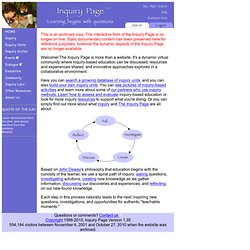
Each step in this process naturally leads to the next: inspiring new questions, investigations, and opportunities for authentic "teachable moments. " Teaching Questioning Skills to Arm Students for Learning - Work in Progress. In the earliest part of my career, I wrote full procedural lesson plans that spelled out to the letter the questions I would ask AND the answers I considered correct.
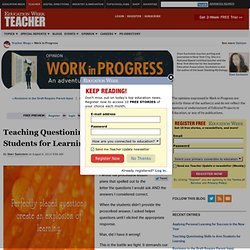
When the students didn't provide the proscribed answer, I asked helper questions until I elicited the appropriate response. Man, did I have it wrong! InquirywithAnything. The Inquiry Project. Questioning Toolkit. Essential Questions These are questions which touch our hearts and souls.
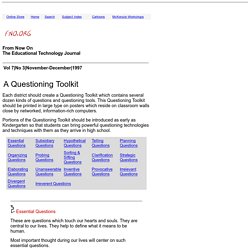
They are central to our lives. They help to define what it means to be human. Most important thought during our lives will center on such essential questions. Authentic Inquiry Maths. Www.earlychildhoodaustralia.org.au/nqsplp/wp-content/uploads/2012/10/NQS_PLP_E-Newsletter_No45. Www.naturalcuriosity.ca/pdf/BranchISection.pdf. For Students, Why the Question is More Important Than the Answer. Thinkstock In a traditional classroom, the teacher is the center of attention, the owner of knowledge and information.
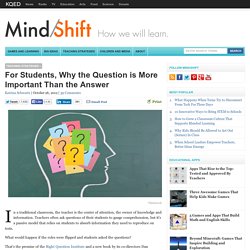
Teachers often ask questions of their students to gauge comprehension, but it’s a passive model that relies on students to absorb information they need to reproduce on tests. What would happen if the roles were flipped and students asked the questions? That’s the premise of the Right Question Institute and a new book by its co-directors Dan Rothstein and Luz Santana.
IBL2. examples. Teachers. Now that students have designed, conducted, and shared the results of their own scientific investigations, they will explore what a scientific experiment entails.
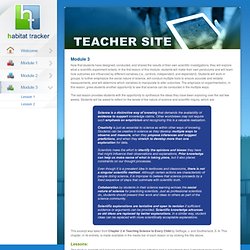
In the first lesson of this module, students will make their own pendulums and will learn how outcomes are influenced by different variables (i.e., controls, independent, and dependent). Students will work in groups, to further emphasize the social nature of science, will conduct multiple trails to ensure accurate and reliable measurements, and will determine which variables to manipulate to alter outcomes. The emphasis on experimentation, in this lesson, gives students another opportunity to see that science can be conducted in the multiple ways.
Critical Thinking: Definitions and Assessments. January 3, 2013 By: Maryellen Weimer, PhD in Educational Assessment Despite almost universal agreement that critical thinking needs to be taught in college, now perhaps more than ever before, there is much less agreement on definitions and dimensions.
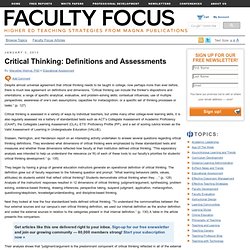
“Critical thinking can include the thinker’s dispositions and orientations; a range of specific analytical, evaluative, and problem-solving skills; contextual influences; use of multiple perspectives; awareness of one’s own assumptions; capacities for metacognition; or a specific set of thinking processes or tasks.” (p. 127) Stassen, Herrington, and Henderson report on an interesting activity undertaken to answer several questions regarding critical thinking definitions.
They began by having a group of general education instructors generate an operational definition of critical thinking. Next they looked at how the four standardized tests defined critical thinking. Despite these limitations, other benefits derive from this kind analysis. Library catalog › Details for: Designing project-based science, connecting learners through guided inquiry /
ePortfolios. Teachers. Module 2 continues to develop the components of the nature of science and scientific inquiry by putting the students in the role of scientists as they embark on an outdoor scientific investigation at the local habitat museum.
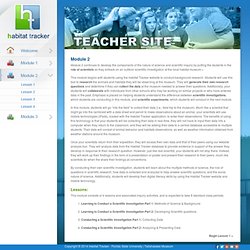
What Does Inquiry Look Like in Kindergarten? The children were engaged in the inquiry process while observing the properties of water. As they worked at learning centres the teacher invited interested children to come and discuss what they know about water and its colour. The children made comments which reflected their emerging understanding of the properties of water. These comments then acted as the basis for which to lead the investigation. The children were then prompted to wonder whether the water is the same colour as the white carnation flower. Next the children considered what would happen if colour was added to the water.
The children made all kinds of hypotheses including “the flowers will die”, “the water will change”, “the water will change the colours of the flowers”. Journal.naeyc.org/btj/vp/pdf/Voices-Stremmel.pdf. Teaching Students How to Conduct Inquiry-Driven Research. If we knew what it was we were doing, it would not be called research, would it? - Albert Einstein Teaching Students How to Conduct Inquiry-Driven Research It always starts with a question. Most of the time there is a simple answer to that question. Learning with the world, not just about it ... Questioning – Top Ten Strategies. “Learn from yesterday, live for today, hope for tomorrow. The important thing is to not stop questioning.” – Albert Einstein Questioning is the very cornerstone of philosophy and education, ever since Socrates ( in our Western tradition) decided to annoy pretty much everyone by critiquing and harrying people with questions – it has been central to our development of thinking and our capacity to learn.
Indeed, it is so integral to all that we do that it is often overlooked when developing pedagogy – but it as crucial to teaching as air is to breathing. The Challenges and Realities of Inquiry-Based Learning. Inquiry Learning Teaching Strategies Getty By Thom Markham Teachers in a rural southeast Michigan high school were recently discussing the odd behavior of the senior class.
It seems the 12th graders were acting more civilly toward the junior class in the hallways. The prom was also quieter and more well-mannered than in previous years. The DBQ Project. Enquiring Minds. Lawrence Hall of Science - 24/7 Science. How fast does the wind blow? What makes things sticky? Where do insects live and plants grow? What is the best way to clean up the environment? How do humans measure up in the animal kingdom? BBB%20Balance%20Healey. Labmouse Online : Labmouse Online. Modeling for Understanding in Science Education - Teaching Strategies. Inquiry Based Learning.
A101_Edelson_etal_99. Create a Culture of Questioning and Inquiry. I have often suggested to teachers that when students have access to technology, whether it is provided by the school in a 1:1, BYOD, or simply the smart phone in their pocket, there should never be a question that goes unanswered –or un-followed. 36 Core Teacher Apps For Inquiry Learning With iPads. Ohio Educational Technology Conference : ORC's Science WINDOW. Can iPads help students learn science? Yes, study shows. The scale of the universe can be difficult to comprehend. Pretend you are going to make a scale model with a basketball representing Earth and a tennis ball as the Moon.
Office of Science Outreach. Inquiry-based Learning With and Without Facilitator Interactions. Abstract. The Interactive Fly. How BYOD Programs Can Fuel Inquiry Learning. Digital Tools. An open education resource supports a diversity of inquiry-based learning. Inquiry-Based Learning - About Us. Library catalog › Details for: Teaching and learning with cases, a guidebook / Www.galileo.org/research/publications/rubric.pdf. Introduction. 1. Students learn isolated skills and knowledge, starting with the simple building blocks of a particular topic and then building to more complex ideas.
Visible Thinking. Inquiry-Questions - home. K12 educational transformation through technology. Schools That Work: Search Model Schools, Education Videos, and Teaching Resources. Eugenics Archive . Science: Rocks and Minerals. Curious Homework: An Inquiry Project for Students and Parents.
5 Tools to Help Students Learn How to Learn. Why Inquiry Learning is Worth the Trouble. Seeing, wondering, theorizing, learning: Inquiry-based instruction with Kishia Moore. Reading Comprehension and Considerate Text, Teaching Today, Glencoe Online. Galileo Educational Network.
Creating Classrooms We Need: 8 Ways Into Inquiry Learning. Examples of Inquiry Based Lessons. TWT: Inquiry-based Learning Strategy. Inquiry Based Learning Projects on Pinterest. OER Commons. Inquiry-Based Lesson Plans. Inquiry-based Learning: Demonstration. JIBLM.org - Journal of Inquiry-Based Learning in Mathematics - IBL Course Notes in Mathematics. 7 Ways Teachers Use Social Media in the Classroom.